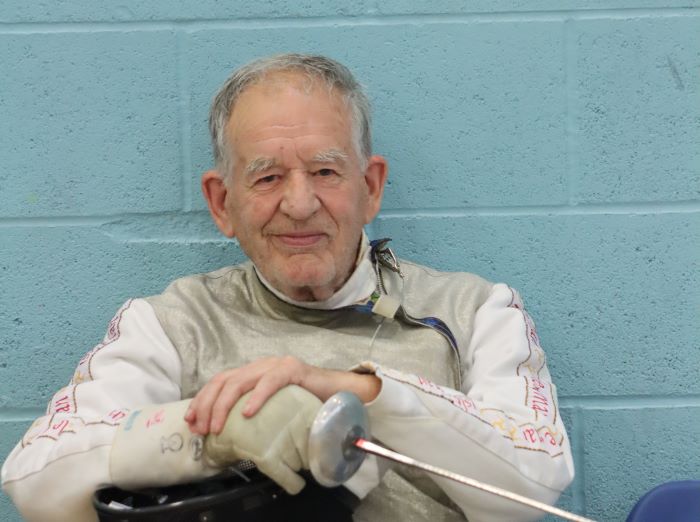HENRY DE SILVA (16/11/1933–16/1/2024)
Henry de Silva, who has died at the age of 90, started fencing when he joined the Royal Navy at 15 and the following year hitchhiked to Paris to fence at the Cité Université. He left the Navy in 1952 and started the Guildford Technical College Fencing Club, going on to become match secretary for Surrey.
After qualifying as a sports coach (he also played rugby and became the Surrey county walking club’s novice champion), he moved to Birmingham where he established the Portland Fencing Club, which at one point had 99 members. Among his pupils was Sue Green, whom he took on her first trip abroad to Krefeld in Germany where she reached the final; she went on to win all the major British women’s foil tournaments, including the senior championship, and twice fenced for Britain at the Olympics.
Henry moved on to Leicester, coaching and fencing competitively whenever he wasn’t lecturing on PE. On his 40th birthday he won the Tyneside Open epee. He started several clubs in the area, becoming chairman of Leicester County Fencing Union and organising the first age group championship for girls.
But his greatest service to the sport was as the founder of veterans fencing. In 1987, he ran the first five-weapon national championships (women’s sabre was added in 1999) for fencers over 45 and 2 years later he formed the National Veterans Association (now British Veterans Fencing). Henry travelled all over the country encouraging older fencers to stay on in the sport. He ran fencing clinics in Europe, Asia and North America; wherever he made a contact willing to arrange a veterans’ match, he gathered a battalion of what became known as ‘Henry’s army’ to spread the gospel of veterans’ fencing to those who had not yet experienced the delights of friendly but hard-fought matches between fencers over 45. They were great fun.
Places he dragged fencers off to included Edinburgh, Munich, Copenhagen, Madrid and Vilnius, and even further afield – Tunisia, Mexico, South Africa, Japan, New Zealand.
In 1991, with a fellow enthusiast in Germany, he formed the European Veterans Association and organised its first championships. From these small beginnings, the movement has grown to become one of the most successful ventures in world fencing, with a UK membership of around 600, biennial European championships now approaching 2000 entries across all weapons for age groups from 40-49 to 75+, annual world championships for qualified fencers over 50 and 4-yearly Commonwealth championships.
When I phoned him a couple of weeks before he died to say how sorry I was to hear about his cancer, he brushed my concern aside and told me off for not mentioning in the piece I had written celebrating his 90th birthday that he had competed in every veterans’ Commonwealth championships, winning a gold medal in his age group four times. I am glad to set the record straight.
That was Henry: blunt and to the point, but passionately devoted to the cause of veterans’ fencing. There is now also a veterans’ Winton Cup, a Celtic challenge and many other competitions for veterans. He was made Life President of British Veterans Fencing, Vice-President of the Commonwealth Veterans Association and was a former Chairman of the European Veterans Association. His huge contribution to the sport was recognised by British Fencing, with the award of a silver medal in 1997 and a gold medal in 2012.
For the past 30 years, Henry lived on the Isle of Man, where he continued to coach, venturing out regularly to compete at veteran events. He also played competitive table tennis and was a regular race walker. At the age of 75 he completed a 10-mile walk in 2 hr 3 min 19 sec, which unofficially made him the fastest man in the country at that distance in his age group. He was a force of nature. Despite his sometimes eccentric behaviour, Henry was held in great affection by countless veteran fencers whose enjoyment of the sport he helped to foster through the movement he founded.
Malcolm Fare

